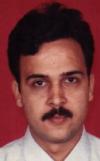
Dr.Ghanshyam Sharma
AYURVEDIC & YOGIC CONCEPT OF VYAYAMA
(EXERCISE)

Dr.Ghanshyam Sharma
In traditional Indian medicine, Charak, the great Ayurvedic physician wrote:By physical exercise one gets lightness, capacity to work, firmness, tolerance of difficulties, diminution of physical impurities, and strengthening of digestion and metabolism. (Charak Samhita)
The most important principle of exercise is that it should enhance rather than diminish energy, and vitality. No matter which program of activity you are following, you should feel live, strong, and energetic both during the exercise and afterward, If you feel exhausted and strained at any point, something is wrong with your particular exercise routine.
Yogic exercise can have many benefits. In addition to reducing stress, healthy activity has a massaging effect on the colon, which soothes intestinal problems. But excessive, exertion and extremely demanding exercise can actually make the system worse. Ideally, exercise should provide relaxation, rather than serve as one more opportunity to make intense demands from the body. The best criteria for judging any exercise is whether you enjoy it. Find the activity that improves your wellbeing and makes you feel good. This is known as total concept of fitness according to Ayurveda.
Ayurveda offers some other specific guidelines regarding exercise: In general, utilise about 50 percent of your capacity. If you can swim twenty
mins, do only ten minutes; if you can run 4 miles, run half. Your capacity represents the total amount of energy available at a given time, beyond which your are completely tired and can't go any further. The purpose of exercise is not to drain all your energy but to produce more of it. For this reason, never work out to your full capacity; stop while your still feel energetic and comfortable both mentally and physically.
Ayurveda recommends regular daily exercise, preferably seven days a week. The reasons many aerobics workouts/programs are recommend only three or four days per week is because they demand all the available energy of the physiology. Yoga practices not only benefit the muscular, cardiovascular, and metabolic systems but also serve to integrate mind and body to order to \ create specific and predictable physiological effects.
DEFINITION OF ASANA
Asana (various Yogic postures) must have the dual qualities of alertness and relaxation. Asana practice involves body exercises. When they are properly practiced there must give alertness without tensions and relaxation without dullness or heaviness.
(Patanjali Yoga Sutra)
YOGA: UPYOGA
Many times when the people talk about Yoga, they focus their attention only on the first component involving varieties of Asanas (postures), Pranayama (breathing practices) and Dhyana (concentration and meditational practices) techniques. Thus they relegate Yoga to a small period of their daily life, as if the day has nothing to do with the Yoga.
But, in reality. the Yogic way of living in the rest of the day is not only equally but more important than the specific health and healing. The Yogic practices need to be used throughout the day. In this sense the UPYOGA: i.e. the use of the Yogic skills throughout the day needs to be given proper attention. The last two components attend to this Upyoga aspect of Yoga.
If we undertake Yoga in this spirit keeping this broad framework in mind and comply with all the instructions given; we would find that Yoga gives us not only a relief from our problem but opens up new way of enjoying life.
Dr.Ghanshyam Sharma
Dr. Ghanshyam Sharma specializes in the applied aspect of Yoga and conducts Yoga Therapy Workshops nationally and internationally for yoga teachers, patients and medical practitioners.
A post-graduate doctorate in 'Indian System of Medicine' (M.D.- Ayu.)from University of Bombay as well as a 'Diploma in Yoga Therapy' (D.Y.T.) from Kaivalyadhama Yogic Health Center, Bombay, INDIA which is one of the oldest and largest yoga therapy institutes in the world where yoga-yherapy is used in conjunction with modern medicine to treat various functional and psychosomatic disorders, Dr Sharma is associated with Yoga Therapy Center (London) which qualifies yoga teachers